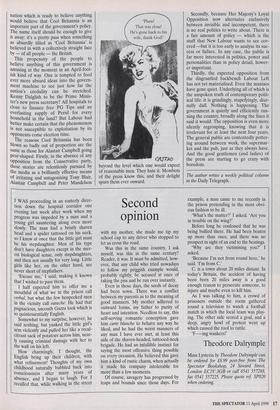Second opinion
I WAS proceeding in an easterly direc- tion down the hospital corridor one evening last week after work when my progress was impeded by a man and a young girl sauntering along even more slowly. The man had a bristly shaven head and a spider tattooed on his neck, Su I knew at once that the little girl must be his stepdaughter. Men of his type don't have daughters except in the mer- est biological sense, only stepdaughters, and then not usually for very long. Little girls like her, on the other hand, are never short of stepfathers. `Excuse me,' I said, making it known that I wished to pass them. I half expected him to offer me a mouthful of what we in the prison call verbal, but what the few henpecked men in the vicinity call earache. He had that Pugnacious, uncouth Gazza look which is so quintessentially English. Somewhat to my surprise, however, he said nothing, but yanked the little girl's arm violently and pulled her like a recal- citrant sack of potatoes across him, near- ly causing criminal damage with her to the wall on his left.
How charmingly, I thought, the English bring up their children, with what refinement! Thoughts of my own childhood naturally bubbled back into consciousness after many years of absence, and I began to laugh. For I recalled that, while walking in the street with my mother, she made me tip my school cap to any driver who stopped to let us cross the road.
Was this in the same country, I ask myself, was this in the same century? Reader, it was. It must be admitted, how- ever, that any child who tried nowadays to follow my priggish example would, probably rightly, be accused at once of taking the piss and be run over instantly.
Even in those days, the seeds of decay had been sown. There was a conflict between my parents as to the meaning of good manners. My mother adhered to outward forms, my father to purity of heart and intention. Needless to say, this self-serving romantic conception gave him carte blanche to behave any way he liked, and he had the worst manners of any man I have ever met, at least this side of the shaven-headed, tattooed-neck brigade. He had an infallible instinct for saying the most offensive thing possible on every occasion. He believed this gave him a kind of rustic charm, when actually it made his company intolerable for more than a few moments.
Of course, savagery has progressed by leaps and bounds since those days. For example, a man came to me recently in the prison pretending in the most obvi- ous fashion to be ill.
`What's the matter?' I asked. 'Are you in trouble on the wing?'
Before long he confessed that he was being bullied there. He had been beaten up more than once, and there was no prospect in sight of an end to the beatings.
`Why are they victimising you?' I asked.
`Because I'm not from round here,' he said. 'I'm from C.'
C. is a town about 20 miles distant. In today's Britain, the accident of having been born 20 miles away is a good enough reason to persecute someone, to injure and maybe even to kill him.
As I was talking to him, a crowd of prisoners outside the room gathered round a television to watch a football match in which the local team was play- ing. The other side scored a goal, and a deep, angry howl of protest went up which caused the roof to rattle.
`F—ing wankers!'
Theodore Dalrymple
Mass Lysteria by Theodore Dalrymple can be ordered for £8.99 post-free from The Spectator Bookshop, 24 Seward Street, London EC1V 3GB or call 0541 557288, fax 0541 557225. Please quote ref SP020 when ordering.


































































 Previous page
Previous page